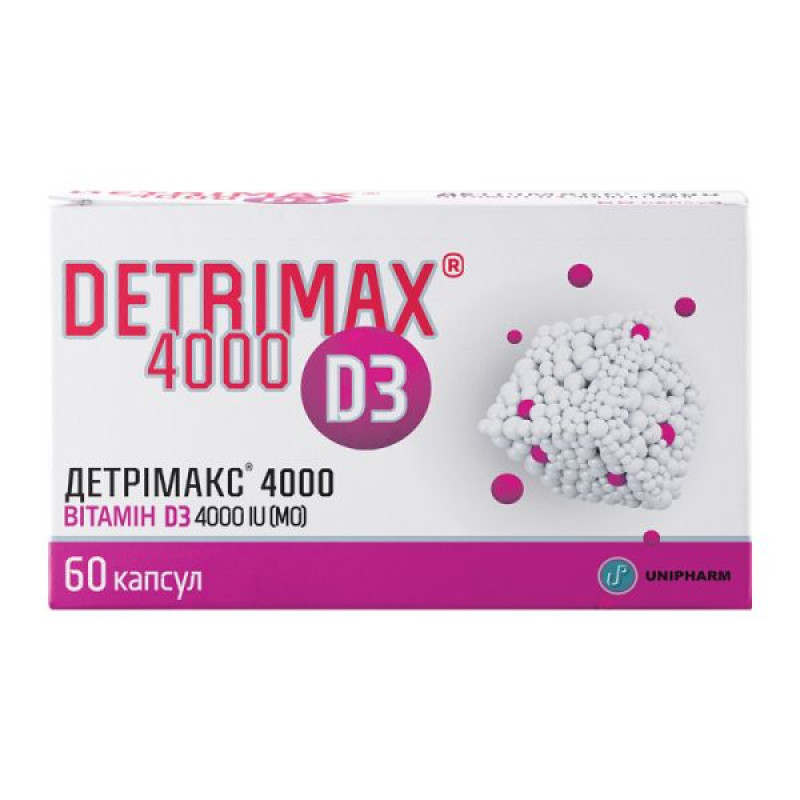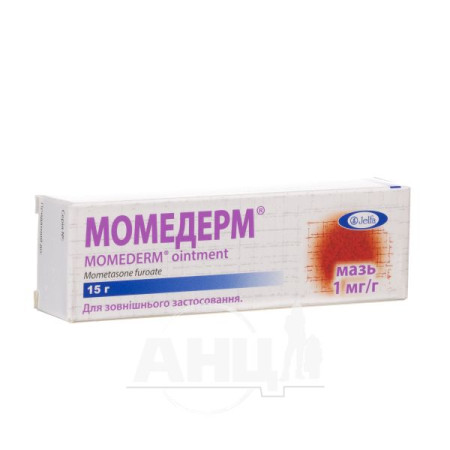Detrimax 4000 capsules 150 mg blister No. 60

Instructions Detrimax 4000 capsules 150 mg blister No. 60
Composition
Per 1 capsule: vitamin D3 (cholecalciferol) 100 µg (mcg) - 4000 IU (IU)
excipients: safflower oil; shell: gelatin, glycerin, water.
Nutritional (food) and energy value (calories)
1 capsule: proteins – 0.04 g (g); fats – 0.08 g (g), carbohydrates – 0.02 g (g); energy value (calories) of 1 capsule: 1.0 kcal (kcal).
Per 100 g (g) of product: proteins – 24.86 g (g); fats – 56.63 g (g), carbohydrates – 14.06 (g) g; energy value (calories) per 100 (g) g of product: 642.9 kcal (kcal).
Properties
DETRIMAX® 4000 – capsules containing vitamin D3 (cholecalciferol) dissolved in safflower oil, which improves the absorption of vitamin D3.
Properties of vitamin D3:
Vitamin D3 is a vital fat-soluble vitamin necessary for the functioning of almost all organs and systems of the human body.
Vitamin D3 regulates about 3% of the human genome, including the genes for the insulin receptor and steroidogenesis (synthesis of all steroid and sex hormones).
According to the results of large-scale studies, insufficient or unsatisfactory levels of vitamin D3 can increase the likelihood of developing metabolic syndrome (MS) by 40%.
Vitamin D3 has a protective effect on endothelial function by stimulating NO synthesis and reducing the formation of reactive oxygen species.
Bone system. Vitamin D3 is involved in the regulation of phosphorus-calcium metabolism: it promotes the absorption of calcium in the intestine, maintains the necessary level of calcium and phosphorus in the blood, activates bone metabolism. It helps ensure the strength of bones and teeth, reduces the risk of rickets and osteomalacia.
Endocrine system. Vitamin D3 affects glucose and insulin metabolism, and vitamin D3 deficiency is a risk factor for the development of insulin resistance, impaired glucose tolerance. Vitamin D3 can stimulate insulin secretion by pancreatic beta cells, and also indirectly activates calcium-dependent endopeptidase of beta cells, which converts proinsulin into active insulin. Vitamin D3 can affect tissue sensitivity to insulin directly, stimulating the expression of insulin receptors in cells. Vitamin D3 has a positive effect on lipid metabolism, contributing to a decrease in the blood level of total cholesterol, triglycerides and low-density lipids. Vitamin D3 plays a significant role in the correction of obesity and the course of metabolic syndrome.
Reproductive function. Vitamin D3stimulates the synthesis of female and male sex hormones: estrogen, progesterone, testosterone. Vitamin D3positively affects the reproductive function of both women and men. It is recommended for use in couples planning pregnancy or experiencing difficulties in conceiving a child. In women with sufficient levels of vitamin D3, fertilization of eggs occurs more often. A normal level of vitamin D3 allows to improve the results of in vitro fertilization. Most likely, this effect is due to the effect of vitamin D3 on the endometrium. Taking vitamin D3 allows to increase the thickness of the endometrium in women with polycystic ovary syndrome. The development of prostate adenoma (PDA) is reliably associated with a deficiency/insufficiency of Vitamin D3, according to available data from clinical and epidemiological studies.
Immune system. Promotes the activation of the body's protective function, positively affecting both innate and acquired immunity. Vitamin D3 triggers the synthesis of the body's own antimicrobial peptides: cathelicidin and defensins. Vitamin D3 helps reduce the risk of developing colds. Vitamin D3 provides a regulatory effect on the growth, development and renewal of immune system cells. Lack of vitamin D3 in the body can lead to a weakening of the body's immune defenses.
Sense organs. The development of diabetic retinopathy, the most common cause of blindness, and macular degeneration (age-related macular degeneration) are associated with vitamin D deficiency. The development and severity of dry eye syndrome is associated with vitamin D deficiency/insufficiency in the body. It has been proven that adding vitamin D to the diet of patients with dry eye syndrome promoted tear secretion, reduced tear instability, and reduced inflammation of the eye surface.
Oncogenesis. Vitamin D3 and its metabolites can reduce the likelihood of developing various types of cancer (the most extensive studies have been conducted on breast cancer and colorectal cancer). Vitamin D3 is able to inhibit tumor angiogenesis (the formation of new blood vessels in tumor tissues), enhance intercellular interactions and thereby slow down proliferation (tissue growth through intensive cell division), in addition, it helps maintain a normal calcium gradient in cells, which is an important factor for the processes of normal cell differentiation, and vitamin D3 also helps reduce the proliferation of cells that are not yet tumorous, but are high-risk.
Cardiovascular system. Vitamin D3 is an important factor in the normal functioning of the cardiovascular system. Vitamin D3 has a positive effect on important factors in counteracting the development of arterial hypertension: normal functioning of the endothelium, the condition of the muscular wall of blood vessels, and blood clotting processes.
Regulation of the energy potential of cells. Helps relieve fatigue and increase the body's tone by regulating the cells' own energy potential. As a result of the influence of vitamin D3 in the mitochondria of cells, the synthesis of ATP (adenosine triphosphate) increases, which is the body's own universal source of energy for all biochemical processes occurring in the body.
Muscular system. Vitamin D3 helps maintain muscle strength and neuromuscular conduction, thereby reducing the risk of falls and fractures.
Bronchopulmonary system. Vitamin D3 helps prevent pathological changes in airway smooth muscles, regulates airway muscle contraction and inflammatory response, which contributes to normal lung function.
Properties of safflower oil:
Safflower oil is a vegetable oil obtained from the seeds of safflower (Carthamus tinctorius), which contains Omega-6 polyunsaturated fatty acids, fat-soluble vitamins E and K. Safflower oil improves the absorption of vitamin D3.
The need for vitamin D3 may increase with:
- insufficient exposure to the sun (including due to work schedule)
- insufficient consumption of foods containing vitamin D3
- vegetarian or low-calorie diet
- living in regions with polluted environments
- sleep deprivation
- using creams with UV filters
Taking DETRIMAX® 4000 capsules (according to the recommendations for consumption) and simultaneously moderate exposure to sunlight does not pose a risk of Vitamin D3 overdose.
Recommendations for use
Dietary supplement to the diet - an additional source of vitamin D3; contributes to the strengthening and normal functioning of the immune, nervous and muscular systems, helps maintain healthy bones and teeth, stimulates the absorption of calcium and phosphorus from the gastrointestinal tract.
Method of administration and doses
Adults take 1 capsule once every 5 days with food, washed down with water.
Term of use
4-8 weeks, then the duration of consumption is agreed with the doctor.
Reservation
Hypersensitivity to vitamin D and manifestations of vitamin D intoxication;
severe renal dysfunction, urolithiasis, increased calcium and/or phosphorus levels in the blood, active forms of pulmonary tuberculosis, sarcoidosis, hypersensitivity to individual components.
During pregnancy or breastfeeding, vitamin D3 should be supplied to the body in the required amount. Vitamin D3 should be used during pregnancy only if necessary in strictly recommended dosage according to the doctor's recommendations. Do not exceed the recommended portion for daily consumption. Do not use as a substitute for a complete diet. Do not consume after the expiration date indicated on the package. Consult a doctor before consumption.
Release form
Capsules weighing 150 mg, 60 capsules in a cardboard box (4 blisters of 15 capsules).
Storage conditions
Store in the manufacturer's original packaging at a temperature of +15 °C to +25 °C. Keep out of the reach of children.
Expiration date
3 years.
It is not a medicine.
There are no reviews for this product.
There are no reviews for this product, be the first to leave your review.
No questions about this product, be the first and ask your question.





